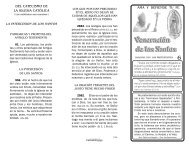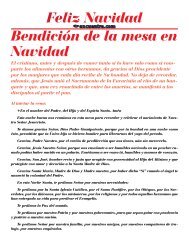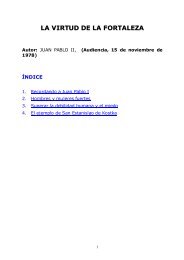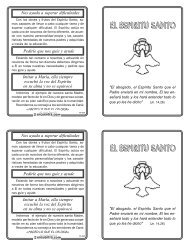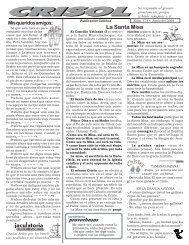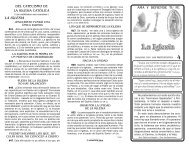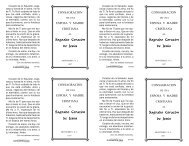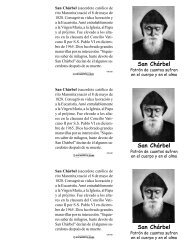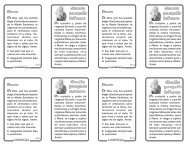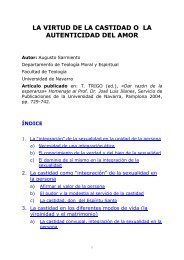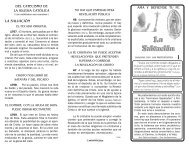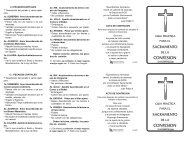La virtud de la prudencia según Tomás de Aquino - El que busca ...
La virtud de la prudencia según Tomás de Aquino - El que busca ...
La virtud de la prudencia según Tomás de Aquino - El que busca ...
Create successful ePaper yourself
Turn your PDF publications into a flip-book with our unique Google optimized e-Paper software.
NOTAS<br />
47<br />
Volver al índice<br />
1 “<strong>La</strong> <strong>virtud</strong> es un hábito electivo <strong>que</strong> consiste en un término medio re<strong>la</strong>tivo a<br />
nosotros, <strong>de</strong>terminado por <strong>la</strong> razón y por a<strong>que</strong>l<strong>la</strong> por <strong>la</strong> cual <strong>de</strong>cidiría el<br />
hombre pru<strong>de</strong>nte”, Ética a Nicómaco, l. II, cap. 6 (BK 1107 a 1-3).<br />
2 Cfr. mi libro Conocer y amar. Estudio <strong>de</strong> los objetos y operaciones <strong>de</strong>l<br />
entendimiento y <strong>de</strong> <strong>la</strong> voluntad <strong>según</strong> <strong>Tomás</strong> <strong>de</strong> <strong>Aquino</strong>, Pamplona, Eunsa,<br />
1995.<br />
3 Sin embargo esta <strong>de</strong>nominación <strong>de</strong>be ser bien entendida, o al menos<br />
matizada, por<strong>que</strong> en rigor, los hábitos son actos, y actos más intensos, más<br />
cognoscitivos por tanto, <strong>que</strong> los actos u operaciones <strong>de</strong> conocer. De modo<br />
<strong>que</strong> el calificativo <strong>de</strong> “potenciales”, en rigor, es inapropiado, aun<strong>que</strong> se<br />
entien<strong>de</strong> lo <strong>que</strong> TOMÁS DE AQUINO intenta p<strong>la</strong>smar, a saber, <strong>que</strong> los hábitos<br />
inferiores están en función <strong>de</strong> los superiores.<br />
4 Cfr. especialmente mi escrito Hábitos y <strong>virtud</strong>es (I-III), Cua<strong>de</strong>rnos <strong>de</strong> Anuario<br />
Filosófico, Serie Universitaria, Nº 65, 66 y 67, Pamplona, Servicio <strong>de</strong><br />
Publicaciones <strong>de</strong> <strong>la</strong> Universidad <strong>de</strong> Navarra, 1998.<br />
5 A <strong>la</strong> vertiente tomista <strong>que</strong> investigó los hábitos pertenecen los gran<strong>de</strong>s<br />
comentadores, CAPREOLO, CAYETANO, SILVESTRE DE FERRARA, JUAN DE STO. TOMÁS,<br />
etc., los <strong>de</strong> <strong>la</strong> Escolástica Renacentista Españo<strong>la</strong>, BÁÑEZ, MEDINA, SOTO, etc., y<br />
posteriormente los encuadrados <strong>de</strong>ntro <strong>de</strong>l neotomismo, tales como PIEPER,<br />
RAMÍREZ, etc.<br />
6 Sobre <strong>la</strong> investigación reciente <strong>de</strong> los hábitos intellectuales <strong>según</strong> TOMÁS DE<br />
AQUINO, cfr.: ABBÀ, G., Lex et virtus. Studi sull´ evolutione <strong>de</strong>l<strong>la</strong> dóctrina<br />
morale di San Tomaso d´ <strong>Aquino</strong>, Biblioteca di Science Religiose, S. C.,<br />
Roma, CAS., 1983; ARNOU, R., L´ home a´t-il le pouvoir <strong>de</strong> connaître le<br />
vérité?: Reponse <strong>de</strong> Saint Thomas: <strong>La</strong> connaisance par habitus, Roma,<br />
Presses <strong>de</strong> l´ Université Gregorianne, 1970; ARRIGNINI, A., L´ abitudine,<br />
Turin, 1937; CANALS, F., Sobre <strong>la</strong> esencia <strong>de</strong>l conocimiento, Barcelona, PPU.,<br />
1978; CARL, M. Th., The First Principles of Natural <strong>La</strong>w: A Study of the Moral<br />
Theories of Aristotle and Saint Thomas Aquinas, Mar<strong>que</strong>tte University, 1989;<br />
CHEVALIER, J., Habitu<strong>de</strong>. Essaie <strong>de</strong> methaphysi<strong>que</strong> scientifi<strong>que</strong>, París, Tournai,<br />
1929; DE LA NOI, P., <strong>La</strong> pru<strong>de</strong>ncia en <strong>la</strong> formación moral a <strong>la</strong> luz <strong>de</strong> Santo<br />
<strong>Tomás</strong>, Santiago <strong>de</strong> Chile, 1963; DE ROTON, P., Les habitus, leur caractère<br />
spirituel, París, <strong>La</strong>bergerie, 1934; GARCÍA LOPEZ, J., <strong>El</strong> sistema <strong>de</strong> <strong>la</strong>s <strong>virtud</strong>es<br />
humanas, México, Editora <strong>de</strong> Revistas, 1986; GEACH, P., <strong>La</strong>s <strong>virtud</strong>es,<br />
Pamplona, Eunsa, 1993; GILSON, E., <strong>El</strong> amor a <strong>la</strong> sabiduría, Caracas, Ayse,<br />
1974; GÓMEZ ROBLEDO, A., Ensayo sobre <strong>la</strong>s <strong>virtud</strong>es intelectuales, México,<br />
FCE., 1957, reimpresión 1986; HAYDEN, R.M., Love and the First Principles of<br />
Saint Thomas Natural <strong>La</strong>w, Tesis Doctoral, University of Saint Thomas 1988;<br />
HAYA, F., <strong>Tomás</strong> <strong>de</strong> <strong>Aquino</strong> ante <strong>la</strong> crítica. <strong>La</strong> articu<strong>la</strong>ción trascen<strong>de</strong>ntal <strong>de</strong><br />
conocimiento y ser, Pamplona, Eunsa, 1994; INAGAKI, B. R., Habitus und<br />
natura in Aquinas, Studios in medieval philosophy, The Catholic University of<br />
America Press, 1987; “The <strong>de</strong>gres of knowledge and habitus according to<br />
Thomas Aquinas”, en Sprache und Erkenntnis in Mite<strong>la</strong>lter, II, 403, 1066-73;<br />
“Metaphysics and habitus in Thomas Aquinas”, en Studies in Medieval<br />
Thought, 20, (1978), 181; ISAACS, D., <strong>La</strong> educación <strong>de</strong> <strong>la</strong>s <strong>virtud</strong>es humanas,



